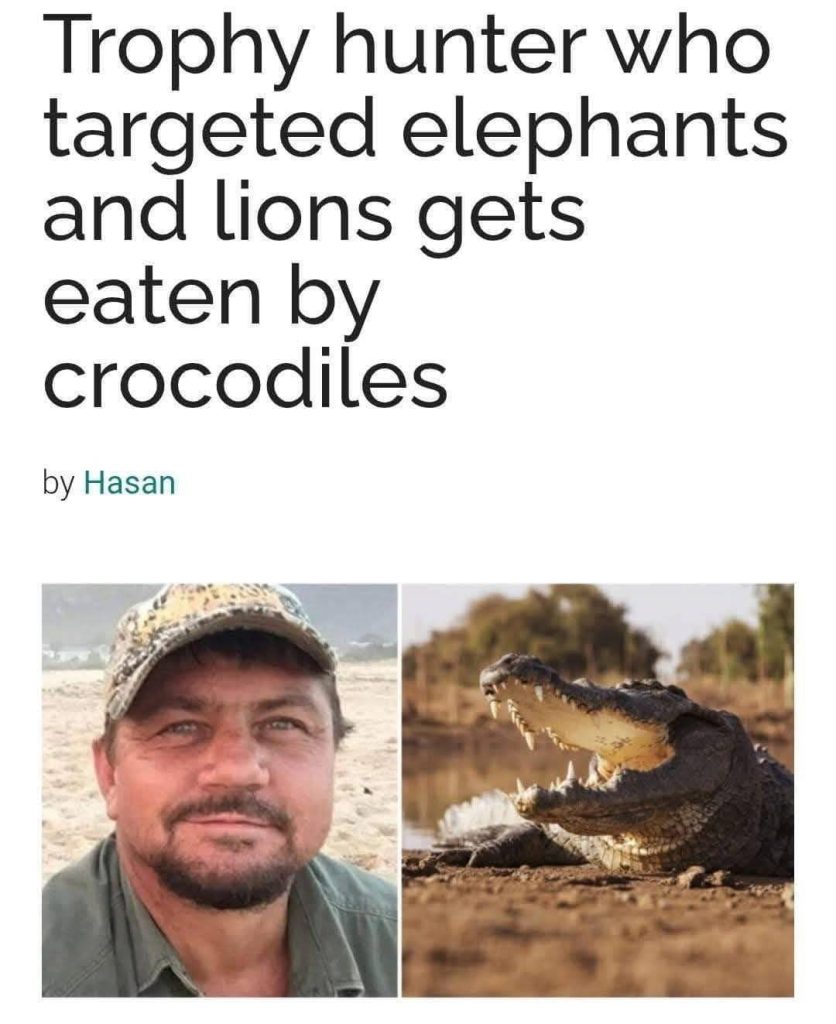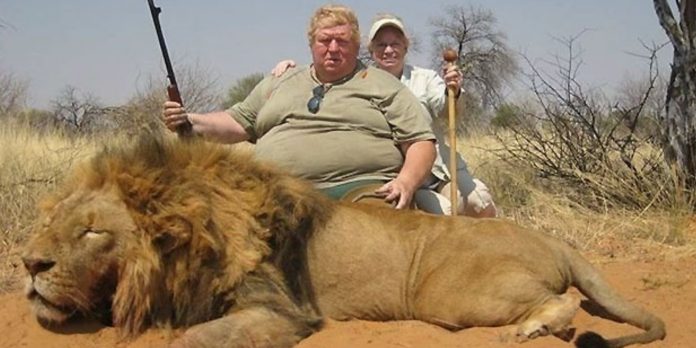Hunting, a practice once driven by necessity, has evolved into a controversial sport for the affluent, often reducing majestic creatures to wall-mounted trophies. While some laud it as tradition or a conservation tool, the ethical implications of trophy hunting reveal a darker reality: a pursuit rooted in dominance, cruelty, and a profound disrespect for life. When hunters fall victim to their quarry, as in the cases of Scott Van Zyl and others, it becomes a grim reminder of nature’s retribution and humanity’s hubris.
The Fatal Consequences of Trophy Hunting: Examples of Poetic Justice
Scott Van Zyl: A Hunter Consumed by His Prey

Scott Van Zyl, a South African big-game hunter, epitomised the arrogance of trophy hunting. Leading expeditions to kill lions, elephants, and other African wildlife, Van Zyl turned slaughter into business. In a bitter twist of fate, his life ended in 2017 when crocodiles—a species he frequently hunted—attacked and consumed him along the Limpopo River. This incident highlights the perils of disregarding the balance of nature, where the hunter became the hunted in a visceral act of poetic justice.
Jose Monino: Colonial Hubris Meets Its End
Jose Monino’s infamous tiger hunts in colonial India symbolised the excess and entitlement of imperial power. Using baited traps to lure and kill tigers, Monino was renowned for his cruelty. In 1845, his hubris led to his demise when a wounded tiger retaliated, killing him in a final act of defiance. Monino’s death underscores the risks inherent in exploiting wildlife and serves as a condemnation of the colonial mindset that treated nature as a resource for amusement.
The Death of Theunis Botha

Theunis Botha, another South African big-game hunter, met a dramatic end during a hunt in Zimbabwe in 2017. Known for his hunting safaris targeting elephants and lions, Botha was trampled to death by an elephant cow after her herd was ambushed. This incident underscores the unpredictability of nature and the dangers of disrupting animal communities for sport.
Other Fatal Encounters
There are countless lesser-known stories of hunters meeting their end in the wild. From trophy hunters fatally gored by elephants to those trampled by enraged buffalo, these incidents illustrate the inherent risks of treating animals as mere targets for sport. Each story adds to a growing body of evidence that challenges the ethics and morality of trophy hunting.
The Ethical Abyss of Trophy Hunting
A Legacy of Cruelty
Trophy hunting is inherently cruel, reducing sentient beings to lifeless decorations. The process often involves prolonged suffering for animals, particularly when hunters fail to deliver a clean kill. Wounded creatures endure pain and terror, their deaths transformed into spectacles of human dominance.
The Fallacy of Conservation
Proponents of trophy hunting argue that it funds conservation. However, this justification is deeply flawed. Studies reveal that only a fraction of the revenue from hunting permits reaches local communities or conservation initiatives. Instead, the practice often perpetuates corruption and the degradation of ecosystems. Killing an animal to save it is an absurd paradox, undermining genuine conservation efforts rooted in coexistence and habitat preservation.
The Psychology of Cruelty
Trophy hunting reflects a troubling psychological need for control and validation. Collecting trophies serves as a testament to dominance, masking deeper insecurities and a lack of empathy. The desensitisation to suffering required for such acts is a hallmark of cruelty, raising ethical concerns about the moral character of those who engage in and support this practice.
Nature’s Retribution: Lessons from Fatal Hunts
The cases of Scott Van Zyl, Jose Monino, and others illuminate a critical truth: nature is not a passive victim. These hunters fell victim to the very creatures they sought to exploit, a poetic form of justice that underscores the dangers of hubris. Nature’s resilience reminds humanity of its place within the ecosystem, challenging the illusion of dominance.
A Call for Ethical Reckoning
Shifting Attitudes
Public opinion is increasingly turning against trophy hunting. Movements advocating for animal rights, biodiversity preservation, and ecological harmony are gaining momentum. Fatal hunting tales fuel this shift, exposing the practice’s inherent cruelty and prompting calls for stricter bans and regulations.
Toward Coexistence
Rather than asserting control over nature, humanity must embrace coexistence. Efforts to protect habitats, curb poaching, and promote eco-tourism offer ethical alternatives that respect wildlife. By valuing animals as living beings rather than trophies, society can foster a more harmonious relationship with the natural world.
The Final Hunt
Trophy hunting stands as a grim testament to humanity’s capacity for cruelty and arrogance. The deaths of hunters like Scott Van Zyl, Jose Monino and Theunis Botha serve as cautionary tales, illustrating the consequences of exploiting and underestimating nature. These stories demand a critical examination of the ethics of hunting, urging society to reject practices rooted in domination and embrace a future founded on respect and coexistence.
The time has come to end the senseless slaughter of wildlife for sport. In doing so, humanity can begin to repair its fractured relationship with the natural world and honour the creatures with whom we share this planet.







